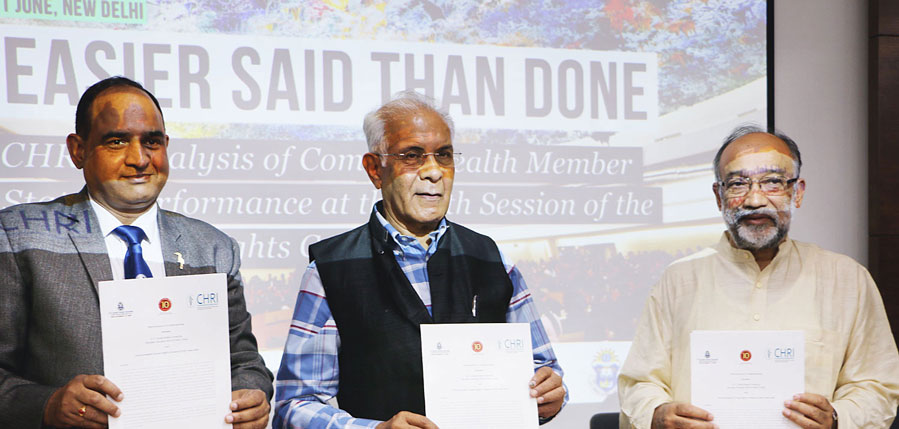Jindal Global University and CHRI sign MoU for close collaboration on human rights issues

New Delhi, 22 June 2019 -- O.P. Jindal Global University (JGU) and Commonwealth Human Rights Initiative (CHRI) have signed a Memorandum of Understanding (MoU) for collaborative research and programmes on human rights, including workshops and training.
The collaboration covers, among other things, internships, fellowships, researcher mobility programmes, joint research and research assistance, joint workshop series for JGU students, collaborative seminars, lectures, talks, discussions and conferences, collaborative summer/winter programmes/workshops/courses (for emerging scholars, students and staff), and collaborative executive education courses.
An agreement to this effect was signed in New Delhi today by JGU’s Centre for Human Rights Studies (CHRS) Executive Director Dr Y.S.R. Murthy and CHRI International Director, Dr. Sanjoy Hazarika.
Speaking about the significance of the MoU Executive Director, CHRS, JGU Dr. YSR Murthy remarked, “We are happy to partner with CHRI to create a range of opportunities for our students and researchers in the field of human rights. The signing of MoU is a logical culmination of existing collaborations in the areas of prisons, access to justice, right to information and other areas. We hope it will prove mutually beneficial.”
Dr. Sanjoy Hazarika, CHRI International Director, said that the partnership would enable a closer connect between academia and human rights defenders as well as encourage scholarship and research in a critical area that was of increasing relevance but coming under extensive pressure, world-wide, from both State and non-state actors, including corporate.
The signing preceded the launch of the ‘Easier Said than Done’ (ESTD) report bought out by CHRI, highlighting the performance of Commonwealth member states at the United Nations Human Rights Council (UNHRC), and to contrast their pledges and voting patterns on human rights issues with conditions in the country. Speakers at the event included former Foreign Secretary Muchkud Dubey, Wahajat Habibulah, CHRI's Chairperson, and the High Commissioner of Fiji, Yogesh Punja. There were two panel discussions with human rights activists, diplomats, academics, policy makers and former senior officials on the importance of human rights in light of the ESTD report, the UNHRC and India’s role at the UNHRC.
The report is being launched for the first time in India, although CHRI has tracked the performance of Commonwealth countries at the UNHRC since the first ESTD report in 2007.
In its recommendations, the ESTD Report urged Commonwealth member states to strengthen the special procedure mechanisms of the UNHRC, provide access on requests, and guarantee their independence and impartiality. CHRI further encouraged Commonwealth member states to comply with their reporting obligations to treaty bodies and submit pending reports on time.
Media coverage: Outlook India | Window to News